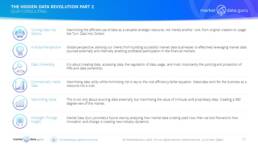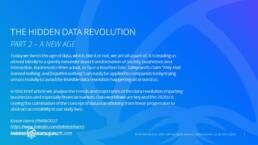
THE NEW AGE OF DATA
Every company, every person is a data creator as well as being a data consumer in the digital world. The ability to identify, access, then analyse the right data gives immediate advantages in terms of making money, business, politics and works to influence market sentiment which then translates into commercial activity.
Many businesses, including financial institutions, are failing to realise they need to first understand the changing world around them and then assess what the most appropriate options available, bearing in mind what works for Company A could well be a disaster for Company B. Information and Data can prove to be unforgiving assets if misused.
FIVE BASIC DATA RULES FOR BUSINESS
What should business be planning for?
1.Proprietary Data: What data assets are available for utilisation from internal resources? Understand and categorise the data attributes
2.Identifying the Gaps: What data is missing, therefore must be sourced externally
3.Filling the Gaps: Identify partners who have the data required, and whether, or not, that source will make the data available
4.Using the Data: Negotiate a licence deal to access and use that data (IP is a huge deal), and,
5.Continuous Validation of Requirements: Have the right tools in place to analyse the data once it is inhouse, and ensure that the available data meets existing and future needs.
Sounds straightforward, but like many other things that appears simple superficially, hides the devil of detail, so this presentation analyses what to look out for in revolutionary times.
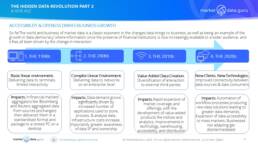
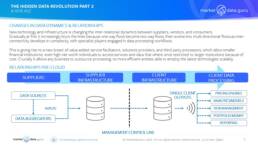
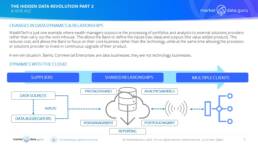
STRATEGIES, AGGREGATION, FRAGMENTATION & COMPETITION
In the new market data world, competition is a function of efficient data utilisation, data management and workflow analysis providing the edge, but companies locked into legacy infrastructure and consumer unfriendly contracts face challenges This encompasses information costs, smart data sourcing, access to infrastructure and adopting new technologies.
Companies must also strike a delicate, yet effective, balance between data security when relying upon say The Cloud for storage and re-distribution and the flexibilities and opportunities it brings. The extent to which control over access to, and the processing of, data is also a function of the ability to prevent unauthorised and/or malign external parties into environments where third parties provide their services.
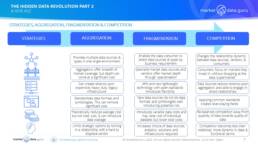
UNLOCKING INNER DATA POTENTIAL
Data is a business asset, a resource that should be exploited to its maximum potential, with two strategies available:
1.Put to work for internal analytical and benchmarking purposes (our focus here), and,
2.Create your own data business. For more detail and discussion please click here
However, before data can be put to work, a fundamental exercise needs to be undertaken in advance, especially as the data probably exists in unique silos residing in databases that have limited connectivity, lacks consistent structures.
Businesses often fail in their endeavour because they do not start in the right place or create an effective framework to manage their data. Incomplete datasets will negatively impact, even negate, any analysis undertaken on them. A point of business failure.
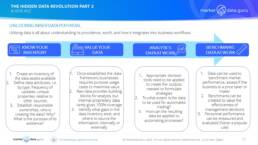
SMART SOURCING DATA
The biggest impact from the ‘Hidden Market Data Revolution’ comes in how the business sources external data in the future. Options are opening up, and the traditional reactive strategy of ‘Waiting for sources to come to us’ becomes ‘Let’s find the data’.
Being data reactive inherently creates business disadvantages, hence new processes for ‘Smart Sourcing’ data comes into play.
No single business can rely solely upon its own data, because it only represents a sub-section of the overall marketplace, so financial institutions (and others) have applied a simple and (Pre-Revolutionary) effective strategy of placing all the sourcing eggs in the basket of one or two universal aggregators, very often both, of either Bloomberg and Refinitiv.
This invisible market data revolution is forcing data consumers to adapt and trade more effectively. While the importance of the universal aggregators will remain intact, because there is a lot of value in having reliable and broad ranging data suppliers, their roles will change, Bloomberg and now Refinitiv as part of LSEG, are working hard to re-orient their business structures without losing sight of their core offerings.
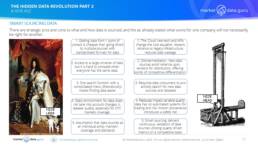
SUMMARY & PREDICTIONS
We see five major impacts that the data revolution is and will have on businesses:
1.Data Provides the Competitive Edge: Financial institutions, and other businesses, will finally realise that data is a resource that gives them identifiable competitive advantages, despite having a cost. Greater emphasis will be placed on understanding what data is available both internally and externally, as well as where the gaps exist and how best to plug them
2.Smart Sourcing: A financial institution’s competitive edge will be driven by data efficiency based upon ‘Smart Sourcing’ where choice in data sources, combined with accessibility, and better data utilisation changes the levels of the playing field, but needs to be constantly validated to maintain advantages. This leads to more competition, greater variety, in global capital markets
3.Swings & Roundabouts: Data source fragmentation will work for and against financial institutions, removing and then introducing new complexities in data management all at the same time. Increased aggregation in the consumer environment rather than at the vendor level means banks have to switch from passive to active involvement in data content issues
4.Data & Technology are Two Different Beasts: These institutions will also discover they are data driven businesses and not technology companies, driving changes in workflow with market data processing for anything non-front office will be undertaken by specialist third parties and solutions providers better able to leverage and continuously upgrade technologies
5.Challenges to Data Ownership: Intellectual Property is the lodestone of the market data industry. In an omni-directional environment where data “wants to be free” (Stewart Brand) and ‘when the strong wind blows, the oak breaks, while the willow bends’ (Greek Fable), data ownership, usage rights, compliance, and regulatory pressure will prove contentious
There won’t be a post-revolutionary time. Trotsky believed in ‘Continuous Revolution’, and the nature of the way we create, distribute, consume, analyse and derive data means his ‘Continuous Revolution’ is coming true on a global scale, just that it is in the realm of data and not Bolshevism. The data version of 1814 France’s Bourbon Restoration of 1814 is just not happening.
Keiren Harris 15 August 2022
Please contact info@marketdata.guru for a pdf copy of the article
For information on our consulting services please email knharris@datacompliancellc.com
